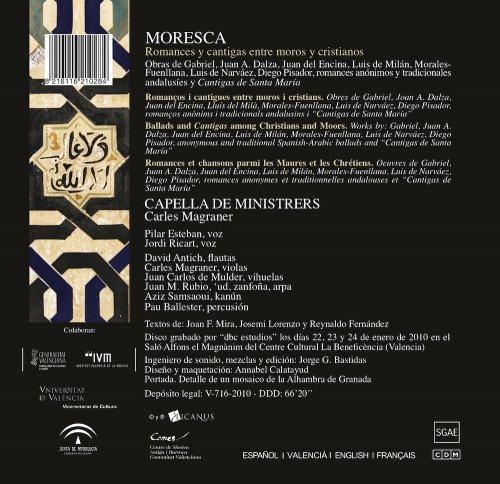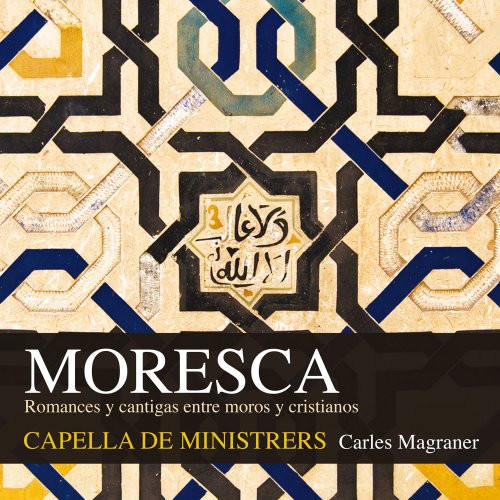
Capella De Ministrers, Carles Magraner - Moresca (2010)
BAND/ARTIST: Capella De Ministrers, Carles Magraner
- Title: Moresca
- Year Of Release: 2010
- Label: CDM
- Genre: Classical
- Quality: flac lossless (tracks)
- Total Time: 01:06:22
- Total Size: 344 mb
- WebSite: Album Preview
Tracklist
01. La Moresca
02. La Reina Sherifa Mora
03. Por fazer mouros guerra
04. Soneto del Faraón de Spaña
05. Aquella Mora Garrida
06. Calbidi castigliano
07. Como Santa Maria livrou u mouro a que queria fillar...
08. Moricos, los Mis Moricos
09. Como Santa maria destruyu un gran poboo de mouros
10. Levanta Pascual
11. Twichia Nuba Asbahan
12. Con Pavor Recordó el Moro
13. Ha Moura Que Tia Seu Fillo en Braços
14. De Antequera Sale el Moro
15. Tres Morillas M'Enamoran
16. La Mora Moraima
17. Paseábase el Rey Moro
18. Como Una Moura Levou Seu Fillo Morto a Santa Maria
19. La Mañana de San Juan

Moorish and Christian romances and cantigas (ballads). The program consists of a selection of works from mediaeval and renaissance Spain, including the beautiful pieces Paseábase el Rey Moro (Narváez), Aquella mora garrida and Tres morillas m' enamoran (from the Cancionero de Palacio—the Palace Songbook).
Every historical event is indelible, but when it is exposed to the conditions of human consciousness, its evocation is almost always fallible and imprecise. From this articulation depends our knowledge of what we call History. But to what extent are we interested in Real History, Factual History, when we have the possibility of telling it in a certain way, pre-selected, interested? This serious question of deontological and axiological proportions implied by marketing with the past is at the base of the aesthetic approach of Carles Magraner in his last medieval proposal, which forces us to question and rethink the interpretative policies and the moral responsibility of performers, musicologists and performers against inherited heritage.
Such propaedeutics becomes necessary when the historian or the musicologist has to face a repertoire of which extramusical elements are part that condition the sound matter itself. This is the case of the music that Magraner has selected to illustrate the dysfunctional coexistence of Moors and Christians in Iberia between the 13th and the 16th centuries. Magraner opts, with very good taste, to defend the program from a historicist, informed and necessarily diachronic position, but without making concessions to "political correctness" (that is, perverting the meaning and meaning of certain original texts - xenophobes or Islamophobes in some case - with alternative words, less offenders) or the official incorrectness of conducting a crude inventoried or a simple content indexing. Magraner chooses an alternative exit, that of the good musicologist, to put in question the question of the otherness between Moors and Christians: choosing with prudence and savoir faire pieces that help us to understand the different ways of assuming or assimilating "otherness"; music in which the "other" (the Moor, the Moorish) is portrayed as friend and enemy, as an uprooted neighbor or wild ladino, as an artilleryman and as a noble brother in arms; paradoxical contradictions, as real in the medieval Spain as in Spain today, that resonate in the buttresses of the program, formed by a selection of six cantons alfonsinas (vocal and instrumental) enrolled in the cycle "miracle worker" (thirteenth century), several vihuelistic pieces of narrative or historical character of the old Romancero (XVI century) and material extracted from the Cancionero de Palacio (XV-XVI).
Playing with the interplay of instrumental pieces and romances and songs, Magraner portrays the perception of the "moruno" without pontificating or relativizing the content: using the extemporaneous and archaized chant of Pilar Esteban and Jordi Ricart and the organist of the Capella de Ministrers ( that counts on instruments like the 'ud or the kanún to reflect the musical syncretism of that hybridated universe) the Valencian director and musicologist glosses this contact in all its possible forms: through the own tragic feeling of the expatriate ("Sonnet of the Pharaoh of Spaña "), of the animosity and hatred (" By fazer a mouros guerra ", CSM 193), of the agapeísta or empathic contemplation (the disturbed and nostalgic" De Antequera leaves the moro "of Morales and Fuenllana) or from the exoticism favored by the orientalist reception (the epigone "Tres morillas m'e enamoran" from the Cancionero de Palacio). A multiple perspective that is enriched by the delightful versification of Juan del Encina ("Levanta Pascual"), Luis de Milán ("With dread recalled the Moor"), Luis de Narváez ("Walked King Moro") or Diego Pisador (" The morning of San Juan ") and musical moods recreated without preciosismos and debated between the melancholy, the despair and the inquina.
Thanks to an honest and philosophical approach given to preserve original works (sometimes racist and discriminatory) as objective documents of a time and space, Magraner proposes a humanistic task that must have been necessarily uncomfortable: telling history without subjugating it or subjecting it to the ethical will of our time, allowing it to speak, breathe and tell all its cruelties and congratulations. The truth that transpires is no less uncomfortable than the will to present it: the vision of the human being as a destitute and voluble creature, as prone to the warmth of the embrace as to the most nefarious attack.
01. La Moresca
02. La Reina Sherifa Mora
03. Por fazer mouros guerra
04. Soneto del Faraón de Spaña
05. Aquella Mora Garrida
06. Calbidi castigliano
07. Como Santa Maria livrou u mouro a que queria fillar...
08. Moricos, los Mis Moricos
09. Como Santa maria destruyu un gran poboo de mouros
10. Levanta Pascual
11. Twichia Nuba Asbahan
12. Con Pavor Recordó el Moro
13. Ha Moura Que Tia Seu Fillo en Braços
14. De Antequera Sale el Moro
15. Tres Morillas M'Enamoran
16. La Mora Moraima
17. Paseábase el Rey Moro
18. Como Una Moura Levou Seu Fillo Morto a Santa Maria
19. La Mañana de San Juan

Moorish and Christian romances and cantigas (ballads). The program consists of a selection of works from mediaeval and renaissance Spain, including the beautiful pieces Paseábase el Rey Moro (Narváez), Aquella mora garrida and Tres morillas m' enamoran (from the Cancionero de Palacio—the Palace Songbook).
Every historical event is indelible, but when it is exposed to the conditions of human consciousness, its evocation is almost always fallible and imprecise. From this articulation depends our knowledge of what we call History. But to what extent are we interested in Real History, Factual History, when we have the possibility of telling it in a certain way, pre-selected, interested? This serious question of deontological and axiological proportions implied by marketing with the past is at the base of the aesthetic approach of Carles Magraner in his last medieval proposal, which forces us to question and rethink the interpretative policies and the moral responsibility of performers, musicologists and performers against inherited heritage.
Such propaedeutics becomes necessary when the historian or the musicologist has to face a repertoire of which extramusical elements are part that condition the sound matter itself. This is the case of the music that Magraner has selected to illustrate the dysfunctional coexistence of Moors and Christians in Iberia between the 13th and the 16th centuries. Magraner opts, with very good taste, to defend the program from a historicist, informed and necessarily diachronic position, but without making concessions to "political correctness" (that is, perverting the meaning and meaning of certain original texts - xenophobes or Islamophobes in some case - with alternative words, less offenders) or the official incorrectness of conducting a crude inventoried or a simple content indexing. Magraner chooses an alternative exit, that of the good musicologist, to put in question the question of the otherness between Moors and Christians: choosing with prudence and savoir faire pieces that help us to understand the different ways of assuming or assimilating "otherness"; music in which the "other" (the Moor, the Moorish) is portrayed as friend and enemy, as an uprooted neighbor or wild ladino, as an artilleryman and as a noble brother in arms; paradoxical contradictions, as real in the medieval Spain as in Spain today, that resonate in the buttresses of the program, formed by a selection of six cantons alfonsinas (vocal and instrumental) enrolled in the cycle "miracle worker" (thirteenth century), several vihuelistic pieces of narrative or historical character of the old Romancero (XVI century) and material extracted from the Cancionero de Palacio (XV-XVI).
Playing with the interplay of instrumental pieces and romances and songs, Magraner portrays the perception of the "moruno" without pontificating or relativizing the content: using the extemporaneous and archaized chant of Pilar Esteban and Jordi Ricart and the organist of the Capella de Ministrers ( that counts on instruments like the 'ud or the kanún to reflect the musical syncretism of that hybridated universe) the Valencian director and musicologist glosses this contact in all its possible forms: through the own tragic feeling of the expatriate ("Sonnet of the Pharaoh of Spaña "), of the animosity and hatred (" By fazer a mouros guerra ", CSM 193), of the agapeísta or empathic contemplation (the disturbed and nostalgic" De Antequera leaves the moro "of Morales and Fuenllana) or from the exoticism favored by the orientalist reception (the epigone "Tres morillas m'e enamoran" from the Cancionero de Palacio). A multiple perspective that is enriched by the delightful versification of Juan del Encina ("Levanta Pascual"), Luis de Milán ("With dread recalled the Moor"), Luis de Narváez ("Walked King Moro") or Diego Pisador (" The morning of San Juan ") and musical moods recreated without preciosismos and debated between the melancholy, the despair and the inquina.
Thanks to an honest and philosophical approach given to preserve original works (sometimes racist and discriminatory) as objective documents of a time and space, Magraner proposes a humanistic task that must have been necessarily uncomfortable: telling history without subjugating it or subjecting it to the ethical will of our time, allowing it to speak, breathe and tell all its cruelties and congratulations. The truth that transpires is no less uncomfortable than the will to present it: the vision of the human being as a destitute and voluble creature, as prone to the warmth of the embrace as to the most nefarious attack.
As a ISRA.CLOUD's PREMIUM member you will have the following benefits:
- Unlimited high speed downloads
- Download directly without waiting time
- Unlimited parallel downloads
- Support for download accelerators
- No advertising
- Resume broken downloads


